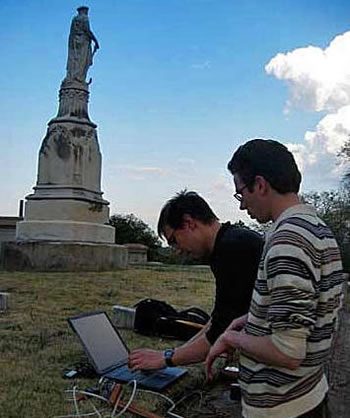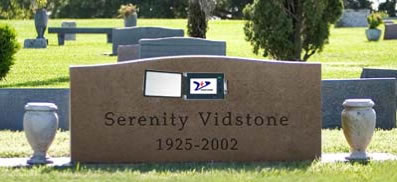Science Fiction
Dictionary
A B C D E F G H I J K L M N O P Q R S T U V W X Y Z
Tributes.com Digital Obituary News

Tributes.com is a new site designed to provide an eternal digital memorial to honor people who have died. It was created by Monster.com founder Jeff Taylor:
“Regardless of which business it is, the consumers have said that their preferred way of getting information is the internet over traditional print,” says Taylor. “For a while, you’ll see obits in both newspapers and on the Web, but my prediction is that eventually they will all be online.”

(Sample obit at Tributes.com)
The idea of having some sort of digital memorial that provides a multi-media cemetary experience is an idea that is on the rise. Consider the augmented reality cemetery tour presented in Atlanta's Oakland cemetery.

(From Augmented Reality cemetery tour)
For another example, take a look at the Vidstone Serenity Panel; it contains a solar-powered LCD display that presents 5-10 minutes of video tribute to the deceased.

(Vidstone Serenity Panel digital headstone)
A Japanese gravestone maker has developed these memorial markers with embedded bar codes in them. Visitors to the grave site can take pictures of the bar code tag with their cell phone cameras, then upload the bar code to a website with details about the deceased. The site also logs how many times the stone is scanned.

(Japanese gravestone with embedded barcode)
SF fans have seen this idea before; they recall the moving holodek ceremony honoring fallen comrade Tasha Yar. See the following video showing a portion of the memorial service from Star Trek: The Next Generation episode Skin of Evil (first broadcast 25-Apr-1988).
(Tasha Yar memorial service video from ST:TNG)
Tributes.com, in acting as a clearinghouse for obituary notices, expects to gain some revenue from advertising, but will also provide the bereaved with an opportunity to present their own tributes for a modest fee.
Update 01/02/2024: Take a look at the lifebox from Rudy Rucker's 1986 story Soft Death. End update.
Read more at Portfolio.com and look at the Tributes.com website; thanks to Moira for the tip on this story.
Scroll down for more stories in the same category. (Story submitted 9/16/2008)
Follow this kind of news @Technovelgy.| Email | RSS | Blog It | Stumble | del.icio.us | Digg | Reddit |
Would
you like to contribute a story tip?
It's easy:
Get the URL of the story, and the related sf author, and add
it here.
Comment/Join discussion ( 0 )
Related News Stories - (" Culture ")
A Remarkable Coincidence
'There is a philosophical problem of some difficulty here...' - Arthur C. Clarke, 1953.
Is It Time To Forbid Human Driving?
'Heavy penalties... were to be applied to any one found driving manually-controlled machines.' - Bernard Brown, 1934.
Indonesian Clans Battle
'The observation vehicle was of that peculiar variety used in conveying a large number of people across rough terrain.' - Jack Vance (1952)
Liuzhi Process Now In Use In China
'He was in a high-ceilinged windowless cell with walls of glittering white porcelain.' - George Orwell, 1984.
Technovelgy (that's tech-novel-gee!) is devoted to the creative science inventions and ideas of sf authors. Look for the Invention Category that interests you, the Glossary, the Invention Timeline, or see what's New.
Science Fiction
Timeline
1600-1899
1900-1939
1940's 1950's
1960's 1970's
1980's 1990's
2000's 2010's
Current News
The New Habitable Zones Include Asimov's Ribbon Worlds
'...there's a narrow belt where the climate is moderate.'
Can One Robot Do Many Tasks?
'... with the Master-operator all you have to do is push one! A remarkable achievement!'
Atlas Robot Makes Uncomfortable Movements
'Not like me. A T-1000, advanced prototype. A mimetic poly-alloy. Liquid metal.'
Boring Company Drills Asimov's Single Vehicle Tunnels
'It was riddled with holes that were the mouths of tunnels.'
Humanoid Robots Tickle The Ivories
'The massive feet working the pedals, arms and hands flashing and glinting...'
A Remarkable Coincidence
'There is a philosophical problem of some difficulty here...'
Cortex 1 - Today A Warehouse, Tomorrow A Calculator Planet
'There were cubic miles of it, and it glistened like a silvery Christmas tree...'
Perching Ambush Drones
'On the chest of drawers something was perched.'
Leader-Follower Autonomous Vehicle Technology
'Jason had been guiding the caravan of cars as usual...'
Golf Ball Test Robot Wears Them Out
"The robot solemnly hit a ball against the wall, picked it up and teed it, hit it again, over and again...'
Boring Company Vegas Loop Like Asimov Said
'There was a wall ahead... It was riddled with holes that were the mouths of tunnels.'
Rigid Metallic Clothing From Science Fiction To You
'...support the interior human structure against Jupiter’s pull.'
Is The Seattle Ultrasonics C-200 A Heinlein Vibroblade?
'It ain't a vibroblade. It's steel. Messy.'
Roborock Saros Z70 Is A Robot Vacuum With An Arm
'Anything larger than a BB shot it picked up and placed in a tray...'
A Beautiful Visualization Of Compact Food
'The German chemists have discovered how to supply the needed elements in compact, undiluted form...'
Bone-Building Drug Evenity Approved
'Compounds devised by the biochemists for the rapid building of bone...'
